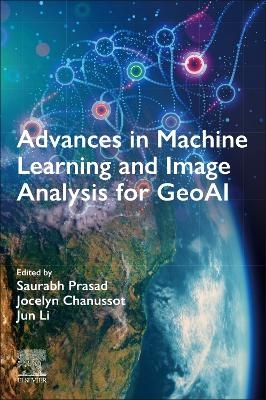
Advances in Machine Learning and Image Analysis for GeoAI
Elsevier - Health Sciences Division (Verlag)
978-0-443-19077-3 (ISBN)
Saurabh Prasad (Senior IEEE Member) is an Associate Professor with the Department of Electrical and Computer Engineering, University of Houston, USA, where he directs the Machine Learning and Signal Processing Laboratory. His lab focuses on advancing state-of-the-art in machine learning and signal processing with applications to remote sensing and biomedicine. His work has been recognized by two student research awards during his Ph.D. study, a best student paper award at the 2008 IGARSS conference, top-10% papers at IEEE-ICIP conference, a NASA New Investigator (Early Career) award in 2014, and the junior faculty research excellence award at the University of Houston in 2017. He was the lead book editor on two Springer books on signal processing and machine learning for hyperspectral image analysis. Jocelyn Chanussot (IEEE Fellow) has been with Grenoble INP since 1999, where he is currently a Professor of signal and image processing. His research interests include image analysis, hyperspectral remote sensing, data fusion, machine learning and artificial intelligence. He has been a visiting scholar at Stanford University (USA), KTH (Sweden) and NUS (Singapore) and is an Adjunct Professor of the University of Iceland. In 2015-2017, he was a visiting professor at the University of California, Los Angeles. He holds the AXA chair in remote sensing and is an Adjunct professor at the Chinese Academy of Sciences, Aerospace Information research Institute, Beijing. Dr. Chanussot is the founding President of IEEE Geoscience and Remote Sensing French chapter for which he which received the 2010 IEEE GRS-S Chapter Excellence Award. He was also the Vice-President of the IEEE Geoscience and Remote Sensing Society, in charge of meetings and symposia; the General Chair of the first IEEE GRSS Workshop on Hyperspectral Image and Signal Processing, Evolution in Remote sensing; Chair and Cochair of the GRS Data Fusion Technical Committee. Jun Li (IEEE Fellow) is a Professor with the School of Geography and Planning, Sun Yat-sen University, Guangzhou, China. Since 2013, she has obtained several prestigious funding grants at the national and international level. Her research interests include remotely sensed hyperspectral image analysis, signal processing, supervised/semisupervised learning, and active learning. Dr. Li currently serves as the Editor-in-Chief for the IEEE Journal of Selected Topics in Applied Earth Observations and Remote Sensing.
1. Introduction 2. Deep Learning for Super-resolution in Remote Sensing 3. Few-Shot Open-Set Recognition of Hyperspectral Images 4. Deep Semantic Segmentation Networks for GeoAI: Impact of Design Choices on Segmentation Performance 5. Estimation of Class Priors for Improving Classification Accuracy 6. Benchmarking and end-to-end considerations for GeoAI-enabled decision making 7. Explainable AI for Earth Observation: Current Methods, Open Challenges, and Opportunities 8. Self-supervised Contrastive Learning for Wildfire Detection: Utility and Limitations 9. Multi-Modal Deep Learning for GeoAI 10. The Power of Voting - Ensemble Learning in Remote Sensing 11. Language and Remote Sensing 12. Spectral Unmixing for Geospatial Image Analysis 13. Applying GeoAI for Effective Large-Scale Wetland Monitoring 14. Leveraging ML approaches for scaling climate data in an atmospheric urban digital twin framework
| Erscheinungsdatum | 08.05.2024 |
|---|---|
| Verlagsort | Philadelphia |
| Sprache | englisch |
| Maße | 152 x 229 mm |
| Gewicht | 560 g |
| Themenwelt | Informatik ► Theorie / Studium ► Künstliche Intelligenz / Robotik |
| Naturwissenschaften ► Geowissenschaften ► Geografie / Kartografie | |
| Naturwissenschaften ► Geowissenschaften ► Geologie | |
| Wirtschaft ► Betriebswirtschaft / Management | |
| ISBN-10 | 0-443-19077-1 / 0443190771 |
| ISBN-13 | 978-0-443-19077-3 / 9780443190773 |
| Zustand | Neuware |
| Informationen gemäß Produktsicherheitsverordnung (GPSR) | |
| Haben Sie eine Frage zum Produkt? |
aus dem Bereich


